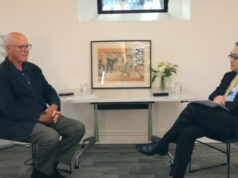‘IT DOES NOT MATTER WHETHER A CAT IS BLACK OR WHITE, AS LONG AS HE CATCHES MICE’
The following article was written recently by Emeritus Professor Dr. Dov Bing, Political Science and Public Policy, University of Waikato.
Professor Paul Clark’s timely article on conspiracy theories being used by some people in this country was spot on. Recent suggestions that the Government of China is interfering with the civil rights of New Zealand citizens are not credible. There are other ways for China to express its displeasure with some of New Zealand’s policies towards China. Prime Minister Jacinda Ardern has recently expressed New Zealand’s human rights concerns about the Uighur people in Xinjiang and the newly imposed Hong Kong security laws which contradict China’s hand over commitment to the United Kingdom in 1997. While China may not have been happy about this critique, it has not yet and is not likely to affect New Zealand’s economic relationship with China which accounts for some 30 % of our trade in goods and services.
Some perspective on Chinas historic challenges may help inform our policy responses. China’s 1.45 billion people represent about 18.5% of the world population and China has great challenges keeping its people supportive of its Government’s policies. Mao Zedong’s great revolutionary experiments after the unification of China were both political and economic disasters. The ‘Great Leap Forward’ from 1957 till 1960 and ’The Great Proletarian Cultural Revolution’ created massive unemployment and many people lost their lives. When Mao Zedong died in 1975, Deng Xiao-ping outmanoeuvred his opponents and introduced more realistic and less ideological policies for China’s recovery. His famous slogan: ‘It does not matter whether a cat is black or white, as long as he catches mice’, replaced ideology with pragmatism to a large extent. Over the next thirty years post Mao, China was able to bring hundreds of millions of people out of poverty through the introduction of an open market economy. As a result, many of the Chinese people could aspire to a middle-class style of living. After the 1980s approximately 100 million people remained unemployed and 150 million continued to work in State Owned Enterprises which invariably needed to be subsidised by the State. With recent economic problems, it has become more problematic for the Government to subsidise these State-Owned Enterprises.
Throughout Chinese history in the Confucian society, it was recognized that if the Emperor lost the ‘Mandate of Heaven’, the people were entitled to march on Beijing and set up a new Government. The current leadership in China are well aware of these historical forces. In a country with a vast populace the Government has to keep the number of unemployed and subsidised workers at a manageable level. This is no small feat and requires good trading relations with the world. China needs New Zealand and other trading partners as much as we need them. China’s leadership will, we hope, realise that political democracy moves hand in hand with prosperity.
A steady hand at the tiller is needed now by our Government that balances solid engagement on matters of human rights with the continuation of good economic and cultural relationships so that our voice continues its relevance to China. Our history of positive engagement and contribution to Chinese progress through Rewi Alley and through recent valuable initiatives in our agri industries have benefited both New Zealand and Chinese people at a grass roots level. China should know that while New Zealand will stand firm on our social values and policies, we are committed to good relations with the Chinese people.
Emeritus Professor Dr.Dov Bing, Political Science and Public Policy, University of Waikato.
Professor Bing is editing and writing a book on the New Zealand Sinophile ‘Rewi Alley and the Chinese Industrial Cooperatives’ comprising a range of historic essays contributed by Rewi Alley’s closest colleagues. These essays have, until recently, been embargoed for 35 years at the request of Rewi Alley to Professor Bing.
This project is being partly funded by our society’s Rewi Alley Friendship and Exchange (RAFE) Fund.




